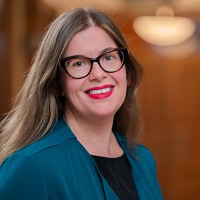Michelle Skop

Associate Professor
Lyle S. Hallman Faculty of Social Work
Waterloo, Ontario
mskop@wlu.ca
Office:
(519) 756-8228 ext. 5352
Expert In
Media Relations
Aonghus Kealy
Communications and Media Relations Officer
akealy@wlu.ca
(548) 889-4855
Click to Expand >>
Communications and Media Relations Officer
akealy@wlu.ca
(548) 889-4855
Click to Expand >>
Media Relations
Aonghus Kealy
Communications and Media Relations Officer
akealy@wlu.ca
(548) 889-4855
Lori Chalmers Morrison
Director: Integrated Communications
lchalmersmorrison@wlu.ca
(548) 889-4857
Vaness Barrasa
Director: Communications & Issues Management
vbarrasa@wlu.ca
(548) 889-3812
Brantford Campus:
Beth Gurney
Interim Senior Executive Officer
bgurney@wlu.ca
(548) 889-4199
Click to Shrink <<
Communications and Media Relations Officer
akealy@wlu.ca
(548) 889-4855
Lori Chalmers Morrison
Director: Integrated Communications
lchalmersmorrison@wlu.ca
(548) 889-4857
Vaness Barrasa
Director: Communications & Issues Management
vbarrasa@wlu.ca
(548) 889-3812
Brantford Campus:
Beth Gurney
Interim Senior Executive Officer
bgurney@wlu.ca
(548) 889-4199
Click to Shrink <<
Bio/Research
My passion for social justice, advocacy, and critical theory was sparked at the University of Toronto where I received an Honours Bachelor of Arts in Women’s Studies and English (2000). From there, I journeyed to Wilfrid Laurier University to complete my MSW degree, specializing in individuals, f...
Click to Expand >>
Click to Expand >>
Bio/Research
My passion for social justice, advocacy, and critical theory was sparked at the University of Toronto where I received an Honours Bachelor of Arts in Women’s Studies and English (2000). From there, I journeyed to Wilfrid Laurier University to complete my MSW degree, specializing in individuals, families, and groups (2002). I then worked in Toronto-based hospital and community mental health settings, providing counselling to and coordinating services for youth, adults, and elderly people. Because of my interest in research, I returned to Laurier’s Faculty of Social Work to pursue doctoral studies with a focus on gender and health (2015). Afterwards, I undertook a one-year postdoctoral fellowship in the Psychology Department at the University of Toronto (2016). Prior to joining the BSW team at Laurier Brantford, I worked as a sessional instructor in Social Work at both Renison University College and the University of Windsor.
For my dissertation study, I explored the healthcare experiences of men and women with fibromyalgia, a chronic condition of unknown origin. I was motivated to research this topic as a result of having coordinated home healthcare services for people with fibromyalgia and encountering with them the discrimination they experienced in the healthcare system. My research combined interviews and focus groups, with an arts-based research method called body-map storytelling, whereby participants created life-size self-portraits to narrate their healthcare journeys. In collaboration with community stakeholders, I held community art galleries in Toronto, Kitchener and London in order to display the body maps with the objective of increasing social awareness about disability.
During my postdoctoral fellowship, I continued to explore the intersections of gender and health by researching masculinities and cancer risk. Specifically, in collaboration with researchers at the Laboratory of Cognitive Neuroscience and Women’s Health (University of Toronto) and the Male Oncology Research and Education Program (Sunnybrook Health Sciences Centre), I conducted a qualitative study investigating the ways in which being at risk for male breast and prostate cancer shaped men’s identities.
As a Laurier faculty member, I have built a program of community-engaged research that addresses issues of oppression, marginalization, and wellbeing and that prepares social workers for socially just practice.
My research aims to: (1) design, implement, and evaluate community-based pedagogies and simulation-based learning programs that support social work students in the development of anti-oppressive practice (AOP) skills; (2) explore how art making and arts-based research methods can foster collectivity and represent embodied and intersectional experiences of illness, disability, health, wellbeing, oppression, and social stigma; and (3) examine how people’s experiences of health and illness are mediated by gender and other intersecting social determinants.
Click to Shrink <<
For my dissertation study, I explored the healthcare experiences of men and women with fibromyalgia, a chronic condition of unknown origin. I was motivated to research this topic as a result of having coordinated home healthcare services for people with fibromyalgia and encountering with them the discrimination they experienced in the healthcare system. My research combined interviews and focus groups, with an arts-based research method called body-map storytelling, whereby participants created life-size self-portraits to narrate their healthcare journeys. In collaboration with community stakeholders, I held community art galleries in Toronto, Kitchener and London in order to display the body maps with the objective of increasing social awareness about disability.
During my postdoctoral fellowship, I continued to explore the intersections of gender and health by researching masculinities and cancer risk. Specifically, in collaboration with researchers at the Laboratory of Cognitive Neuroscience and Women’s Health (University of Toronto) and the Male Oncology Research and Education Program (Sunnybrook Health Sciences Centre), I conducted a qualitative study investigating the ways in which being at risk for male breast and prostate cancer shaped men’s identities.
As a Laurier faculty member, I have built a program of community-engaged research that addresses issues of oppression, marginalization, and wellbeing and that prepares social workers for socially just practice.
My research aims to: (1) design, implement, and evaluate community-based pedagogies and simulation-based learning programs that support social work students in the development of anti-oppressive practice (AOP) skills; (2) explore how art making and arts-based research methods can foster collectivity and represent embodied and intersectional experiences of illness, disability, health, wellbeing, oppression, and social stigma; and (3) examine how people’s experiences of health and illness are mediated by gender and other intersecting social determinants.
Click to Shrink <<